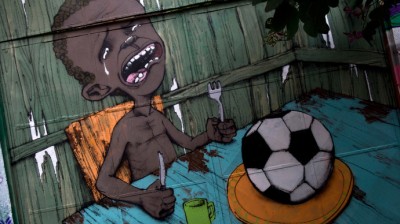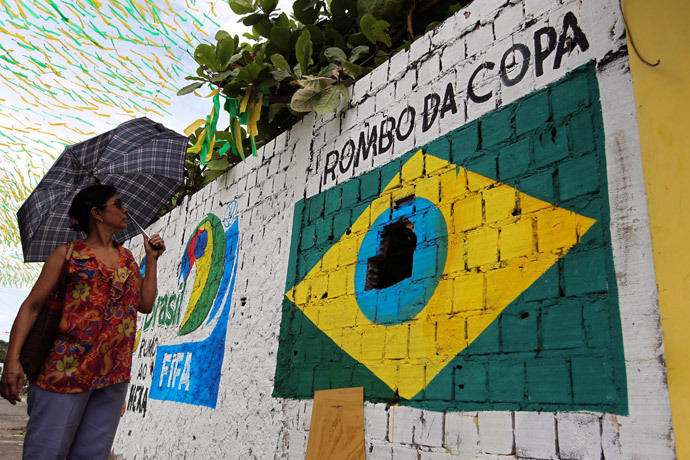‘Need Food, not Football’: Brazilian Graffiti Art Expresses Outrage Over World Cup
Photos

A graffiti painted by Brazilian street artist Paulo Ito on the entrance of a public schoolhouse in Sao Paulo, Brazil on May 23, 2014. (AFP Photo / Nelson Almeida)
With just two weeks remaining until the World Cup kicks off in Brazil, those who believe the global event is too much of a burden for the country’s struggling economy have found a new way to channel their protest energy – with graffiti.
Street artists have covered walls in Rio de Janeiro and Sao Paulo with pictures which blame football’s governing body, FIFA, for exploiting Brazil and the local government for neglecting the needs of the poor.
They share the belief that the US$11 billion which has been spent on the World Cup should have been used to improving transportation, healthcare, and education.
“It’s a good way to expose the country’s problems,” graffiti artist Pauo Ito told the Guardian. “If the government doesn’t want to expose these things it’s because they feel ashamed. If they feel ashamed by this they might take it more seriously – at least, that’s our intention.”
Anti-World Cup Graffiti in Brazil protesting against the governments priorities. pic.twitter.com/cTjg6dDSNw
— Deco Gee (@declanglass10) May 21, 2014
Despite the Brazilians’ passion for football, over one million people took to the streets across the country last year demanding the cancelation of the World Cup.
The people’s outrage is only increasing as the tournament draws nearer – even Brazil’s training session ahead of the event was marred by protests.

A graffiti depictingTatubola (L), the mascot of the upcoming FIFA World Cup, Tatubola, can be seen on a wall of the Maracana metro station, the nearest one to the Maracana stadium, during the restoration works ahead of the upcoming FIFA World Cup in Rio de Janeiro, Brazil, on May 28, 2014. (AFP Photo / Yasuyoshi Chiba)

Ryan, 9, eats in front of graffiti painted by members of OPNI, in reference to the 2014 World Cup, in the Vila Flavia slum of Sao Paulo May 28, 2014. (Reuters / Nacho Doce)

A homeless man walks past graffiti that reads “FIFA go home” in Rio de Janeiro May 28, 2014. (Reuters / Sergio Moraes)
Meanwhile, graffiti that celebrates the upcoming tournament and the country’s football heroes – who will be hoping for their sixth world title at the home event – is being vandalized.

People walk past a vandalized graffiti depicting Brazilian national footballer Neymar with a hood used by members of the anarchist group known as Black Bloc which is against of the FIFA World Cup Brazil 2014 football tournament, in Rio de Janeiro, Brazil, on May 27, 2014. (AFP Photo / Yasuyoshi Chiba)

A pedestrian looks at a graffiti in protest against the 2014 World Cup that shows the Brazilian flag painted around a hole in a wall in Manaus, one of the host cities, May 23, 2014. (Reuters / Bruno Kelly)

A public bus drives over a graffiti referencing the 2014 World Cup in Rio de Janeiro May 22, 2014. (Reuters / Ricardo Moraes)

A woman walks with her child on her shoulders in front of graffiti against the infrastructure work for the 2014 World Cup at the Metro Mangueira slum near the Maracana Stadium in Rio de Janeiro April 10, 2013. (Reuters / Sergio Moraes)

A man walks past by graffiti painted on the a wall in reference to the 2014 World Cup in Rio de Janeiro May 14, 2014. (Reuters / Sergio Moraes)

A man rides his bike past a graffiti referencing the 2014 World Cup in Rio de Janeiro May 23, 2014. (Reuters / Ricardo Moraes)

